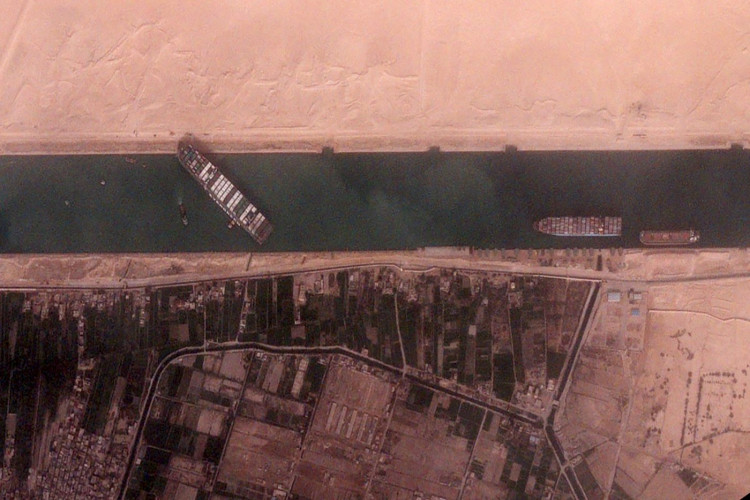Nearly $10 billion worth of goods every day has ground to a halt as one of the world's largest container ships, the Ever Given, remains stuck in Egypt's Suez Canal, blocking traffic for the main shipping route between Asia and Europe.
Clearing the 400-meter long (yards) and 59-meter wide, 224,000-metric ton ship, which ran aground in the narrow waterway during a sandstorm Tuesday, would free ship traffic to resume carrying everything from oil to food to chemicals and machinery.
But the work to dislodge Ever Given has proven more complex than expected and could take more than a week, according to news reports and analysts.
According to BIMCO, the largest of the international shipping associations representing ship owners, the bottleneck will only continue to grow and impact supplies.
"Everyone is making contingency plans as we speak," said Peter Sand, chief shipping analyst at BIMCO.
MAJOR TRADE ROUTE
About 10% of all global trade flows through the 120-mile-long (193-kilometer-long) canal, which allows tankers and container ships to avoid a long trip around the southern tip of Africa.
"The fact that you have the most pivotal node in the trading network being blocked is going to have important welfare effects around the world," said Woan Foong Wong, an economics professor at the University of Oregon.
Global shipping was already under stress because of a shortage of containers and normal trade flows disrupted by the COVID-19 pandemic. That includes trapped crews on merchant ships unable to dock and unload their goods. Shortages of semiconductors and rare-earth elements have plagued manufacturers of cars and other consumer products.
"Containers are already scarce in China and the backup in the Suez will further stress the inventory," explained Jon Monroe, maritime trade and logistics consultant with Jon Monroe Consulting.
"We are back to a pre-Chinese New Year environment where factories are running at full steam and are struggling to find containers as well as space for their finished goods."
HIGHER ENERGY PRICES
Europe could soon too see higher gas prices because they rely on oil shipments from the Middle East.
About 1.9 million barrels of oil a day go through the canal, according to trade data, about 7% of all seaborne oil.
"If this were to last a month, there are other options, and you can sail around Africa. Of course, that would add cost," said Jim Burkhard, who heads crude oil research at IHS Markit. "If this ship is moved in the next week, it will be a footnote in history when it comes to the oil market."
Tankers using the Suez carry 8% to 10% of the world's liquefied natural gas, according to research firms. Wood Mackenzie analyst Lucas Schmitt said only a few LNG shipments were near the canal when the blockage occurred.
"We don't expect major bottlenecks unless the situation drags on," Schmitt said.






